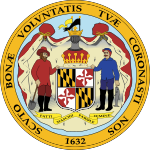
1914 United States House of Representatives elections were elections for the United States House of Representatives to elect members to serve in the 64th United States Congress. They were held for the most part on November 3, 1914, while Maine held theirs on September 14. They were held in the middle of President Woodrow Wilson's first term.

The 1904 United States House of Representatives elections were held for the most part on November 8, 1904, with Oregon, Maine, and Vermont holding theirs early in either June or September. They coincided with the election to a full term of President Theodore Roosevelt. Elections were held for 386 seats of the United States House of Representatives, representing 45 states, to serve in the 59th United States Congress.
The 1820–21 United States House of Representatives elections were held on various dates in various states between July 3, 1820, and August 10, 1821. Each state set its own date for its elections to the House of Representatives before the first session of the 17th United States Congress convened on December 3, 1821. They coincided with President James Monroe winning reelection unopposed.

The 1810–11 United States House of Representatives elections were held on various dates in various states between April 24, 1810, and August 2, 1811. Each state set its own date for its elections to the House of Representatives before the first session of the 12th United States Congress convened on November 4, 1811. They occurred during President James Madison's first term. Elections were held for all 142 seats, representing 17 states.

The 1802–03 United States House of Representatives elections were held on various dates in various states between April 26, 1802 and December 14, 1803. Each state set its own date for its elections to the House of Representatives, either before or after the first session of the 8th United States Congress convened on October 17, 1803. They occurred during President Thomas Jefferson's first term in office.

The 1796–97 United States House of Representatives elections took place in the various states took place between August 12, 1796, and October 15, 1797. Each state set its own date for its elections to the House of Representatives. The size of the House increased to 106 seats after Tennessee became the 16th state to join the union. The first session of the 5th United States Congress was convened on May 15, 1797, at the proclamation of the new President of the United States, John Adams. Since Kentucky and Tennessee had not yet voted, they were unrepresented until the second session began on November 13, 1797.

The 1792–93 United States House of Representatives elections were held on various dates in various states between August 27, 1792, and September 6, 1793. Each state set its own date for its elections to the House of Representatives before the first session of the 3rd United States Congress convened on December 2, 1793. With the addition of the new state of Kentucky's representatives, and the congressional reapportionment based on the 1790 United States census, the size of the House increased to 105 seats.
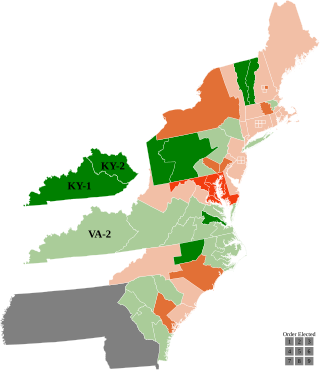
The 1790–91 United States House of Representatives elections were held on various dates in various states between April 27, 1790, and October 11, 1791. Each state set its own date for its elections to the House of Representatives before or after the first session of the 2nd United States Congress convened on October 24, 1791. This was the first midterm election cycle, which took place in the middle of President George Washington's first term. The size of the House increased to 67 seats after the new state of Vermont elected its first representatives.

The 1788–89 United States House of Representatives elections were the first U.S. House of Representatives elections following the adoption of the Constitution of the United States. Each state set its own date for its congressional elections, ranging from November 24, 1788, to March 5, 1789, before or after the first session of the 1st United States Congress convened on March 4, 1789. They coincided with the election of George Washington as the first president of the United States.

Maryland's 8th congressional district is concentrated almost entirely in Montgomery County, with a small portion in Prince George's County. Adjacent to Washington, D.C., the 8th district takes in many of the city’s wealthiest inner-ring suburbs, including Bethesda, Chevy Chase, and Potomac. It also includes several more economically and racially diverse communities, the most populous of which are Rockville and Silver Spring.
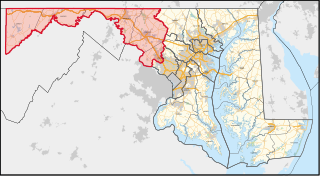
Maryland's 6th congressional district elects a representative to the United States House of Representatives from the northwest part of the state. The district comprises all of Garrett, Allegany, Frederick, and Washington counties as well as a portion of Montgomery County. David Trone (D) is its current representative.

Maryland's 7th congressional district of the United States House of Representatives encompasses almost the entire city of Baltimore and some of Baltimore County. The district was created following the census of 1790, which gave Maryland one additional representative in the House. It was abolished in 1843 but was restored in 1950 as a west Baltimore district. It has been drawn as a majority-African American district since 1973. Democrat Kweisi Mfume is the current representative, winning a special election on April 28, 2020, to finish the term of Elijah Cummings, who died in October 2019. Mfume had previously held the seat from 1987 to 1996.
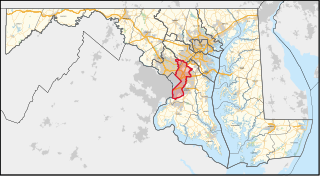
Maryland's 4th congressional district wraps around the eastern edge of Washington, D.C., taking in most of Prince George's County and a small portion of Montgomery County. It is home to several racially diverse middle-class suburbs, including College Park, Fort Washington, Greenbelt, and Laurel. With a median household income of $86,941, it is the wealthiest black-majority district in the United States.
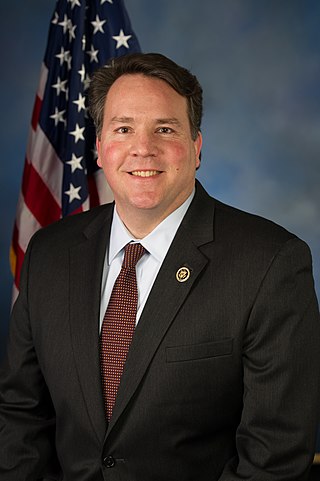
Alexander Xavier Mooney is an American politician serving since 2015 as the U.S. representative from West Virginia's 2nd congressional district. A member of the Republican Party, he represented the 3rd district in the Maryland State Senate from 1999 to 2011 and is a former chair of the Maryland Republican Party. He is the first Hispanic person elected to Congress from West Virginia.

The 1789 United States House of Representatives elections in Maryland were held from December 15, 1788, to January 10, 1789, to elect the six U.S. representatives from the state of Maryland, one from each of the state's six congressional districts. The elections coincided with the 1788–89 U.S. presidential election , as well as other elections to the House of Representatives, elections to the United States Senate and various state and local elections.

The 1816 special elections for Maryland's 5th congressional district were to fill two separate vacancies. The 5th district was a plural district, with two seats. Both seats were vacated, the first by Representative Nicholas R. Moore (DR) in 1815, before the 14th Congress even met, and the second by Rep. William Pinkney (DR) on April 18, 1816 after being named Minister to Russia.

A special election was held in Maryland's 3rd congressional district in 1816 to fill a vacancy left by the resignation of Alexander C. Hanson (F) upon being elected to the United States Senate.

The 2014 United States House of Representatives elections in Maryland were held on Tuesday, November 4, 2014 to elect the eight U.S. representatives from the state of Maryland, one from each of the state's eight congressional districts. The elections coincided with other elections to the United States Senate and House of Representatives and various state and local elections, including the governor of Maryland, attorney general of Maryland and comptroller of Maryland.

The 2018 United States House of Representatives elections in Maryland were held on November 6, 2018, electing the eight U.S. representatives from the State of Maryland, one from each of the state's eight congressional districts. The elections coincided with the elections of other offices, including a gubernatorial election, other elections to the House of Representatives, elections to the United States Senate, and various state and local elections.

The 2022 United States House of Representatives elections in Maryland were held on November 8, 2022, to elect the eight U.S. representatives from the state of Maryland, one from each of the state's eight congressional districts. The elections coincided with other elections to the House of Representatives, elections to the United States Senate, and various state and local elections. The Democratic and Republican primaries were held on July 19.
